Answer these simple questions and we will find you the BEST prices
Which type of solar quotes do you need?
It only takes 30 seconds
100% free with no obligation

Get Free quotes from insulation specialists near you

Save money by comparing quotes and choosing the most competitive offer

The service is 100% free and with no obligation
- GreenMatch
- Insulation
- Garage Insulation
- Garage Roof Insulation
Garage Roof Insulation: How to Install It & Is It Worth It?

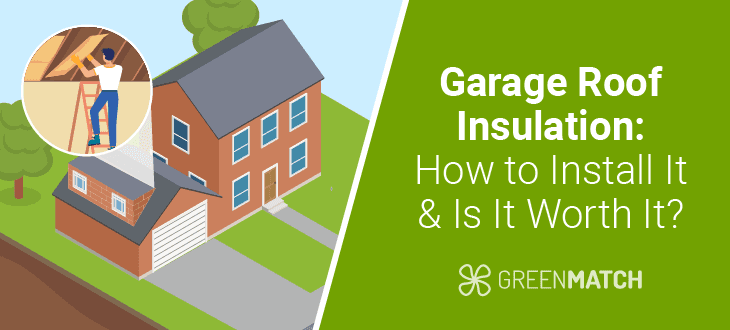
- Garage roof insulation costs around £50 per m2, depending on the material and installation complexity.
- Insulating a garage roof reduces heat loss by up to 25%, lowers energy bills, prevents condensation, and makes the space more comfortable year-round.
- Garage roof insulation works for metal, pitched, and flat roofs, using spray foam for metal, warm loft insulation for pitched, and rigid foam boards for flat roofs to boost thermal efficiency and prevent condensation.
Garage roof insulation is a highly effective upgrade for homeowners seeking to enhance energy efficiency and reduce heat loss. With approximately 11 million garages across the UK, many remain uninsulated, allowing a significant amount of warmth to escape. In fact, up to 25% of your garage heat can be lost through an uninsulated roof, making it a critical area to address regarding energy savings.
Whether your garage is attached to your home, has a room above it, or stands as a separate structure, insulating the roof can lead to noticeable reductions in energy bills, improved comfort, and even increased property value. In this guide, we will explore the benefits of garage roof insulation, the step-by-step installation process for both flat and pitched roofs, and provide insight to help you determine whether this investment suits your property.
If you’re considering garage roof insulation, it’s essential to obtain multiple quotes to ensure the best value and to work with experienced insulation specialists in your area. However, finding the right contractor can be time-consuming and challenging. Fortunately, GreenMatch UK is here to streamline the process. Complete our 30-second form, and we will connect you with up to four free quotes from trusted insulation specialists in your region. Click below to learn more.
- Describe your needs
- Get free quotes
- Choose the best offer
It only takes 30 seconds



Why insulate a garage roof?
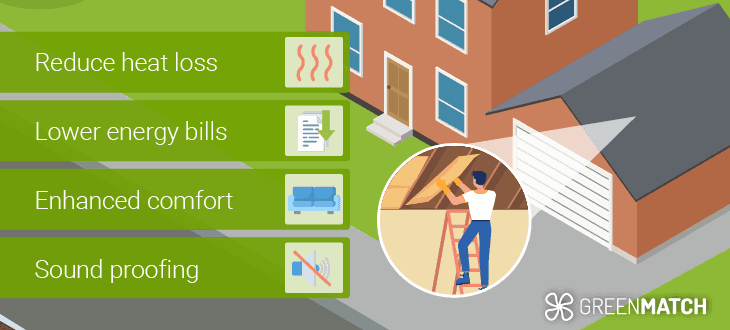
Garage roof insulation offers several key benefits that can improve your home's overall comfort and efficiency. By insulating a roof, particularly in a garage, you can significantly reduce heat loss. Garages, especially those attached to a home or with living spaces above them, can act as a thermal bridge, allowing heat to escape during winter and letting in excess heat during summer. By installing garage ceiling insulation, you create a thermal barrier that helps maintain consistent indoor temperatures, lowering the strain on your heating and cooling systems.
An insulated garage roof reduces heat loss, which greatly improves the comfort of your garage. If your garage is attached to your home, this can also help lower your energy bills by preventing heat from escaping through the garage.
By insulating the ceiling, you can transform your garage into a more functional, liveable space. Even if using it as a living area isn’t your goal, insulation helps regulate temperatures, protecting your belongings and vehicles from the damaging effects of extreme heat, cold, and condensation.
In addition to temperature control, an insulated garage roof can also provide acoustic benefits, particularly if you choose soundproofing insulation. This reduces noise pollution within the garage, making it especially useful for garages with living spaces above, such as spare bedrooms or home offices. Even standalone or attached garages benefit from this, as it helps dampen noise from the outside, creating a quieter environment both inside the garage and the home.
How to insulate a garage roof
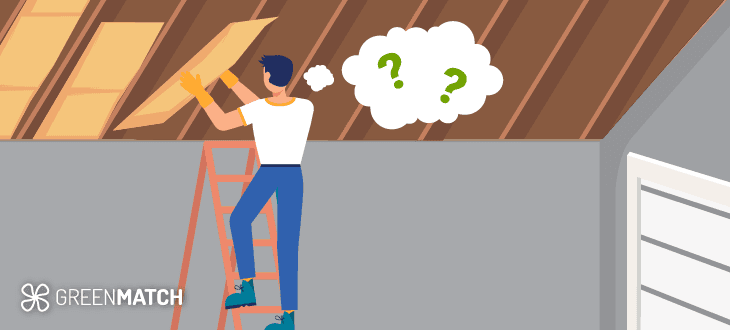
Garage insulation is crucial for reducing heat loss and improving the overall comfort of the space. Depending on the type of roof—whether it's flat, pitched, or made of metal—the insulation method may vary. Below, we explore how to insulate the different ways to insulate a garage roof:
Flat roofs typically use either warm or cold roof insulation:
- Warm roof insulation: Rigid insulation boards are placed on top of the roof deck, under a waterproof membrane, with a vapour control layer to prevent moisture buildup.
- Cold roof insulation: Insulation is installed between roof joists beneath the deck, with a vapour barrier added before reinstalling the ceiling.
Pitched roofs offer two options:
- Warm loft insulation: Insulation boards are installed above the rafters, followed by a waterproof membrane. This may require removing the roof covering.
- Cold loft insulation: Insulation is placed between rafters with a vapour barrier, then finished with plasterboard or ceiling panels.
Additionally, metal roof insulation requires careful insulation to prevent heat loss and condensation:
- Spray foam insulation: Provides an airtight seal, preventing condensation and improving thermal efficiency.
- Rigid foam board Insulation: Boards are installed under the roof with battens, ensuring proper ventilation and soundproofing.
What is the best insulation for a garage roof?
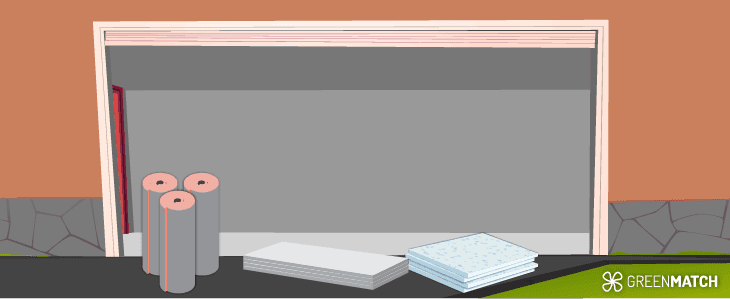
When selecting the best roof insulation for your garage roof, it’s essential to consider thermal performance, cost, ease of installation, and sustainability. Here are some of the most suitable options:
- Rigid foam boards: Known for excellent thermal performance, they are lightweight, moisture-resistant, and easy to install in flat and pitched roofs. PIR boards often contain recycled content, though their production is energy-intensive. Costs range from £10 to £21.50 per square metre.
- Spray foam: Offers a high R-value per inch and creates an airtight seal, making it ideal for hard-to-reach areas and metal roofs. However, it’s costly (starting at £21.50 per square metre), requires professional installation, and is difficult to remove. It's also petroleum-based, contributing to environmental concerns.
- Fibreglass: This is an inexpensive and widely available option, especially popular for pitched roofs. Priced at around £10 per square metre, it's easy to install but less effective in extreme temperatures and may irritate the skin. It is made from recycled glass, though its production can be energy-intensive.
- Cellulose: A highly sustainable option made from recycled paper, offering good thermal performance and soundproofing. Costing around £11 per square metre, it's one of the most eco-friendly choices, but it's prone to moisture absorption, which can lead to mould if not properly sealed.
Each material has pros and cons, so choosing one that suits your specific garage roof insulation needs and environmental priorities is important.
Garage roof insulation cost

Garage roof insulation costs can vary depending on the type of insulation material, the size of the roof, labour costs, and the complexity of the installation. On average, homeowners can expect to spend between £50 per square metre for garage ceiling insulation, including materials and installation.
Here's a breakdown of the average costs of insulation materials per square metre:
| Material | Cost per m2 |
|---|---|
| Fibreglass | £10 |
| Rigid foam boards | £10 to £21.50 |
| Cellulose | £11 |
| Spray foam | £21.50 or more |
The costs of roof tile insulation depend on whether insulation is added beneath the tiles or between the rafters in a pitched roof, as these methods require more precision and labour, especially for pitched roofs. The choice of materials—whether spray foam, rigid foam boards, or others—also impacts the overall price, with spray foam typically being the most expensive but offering superior thermal performance.
Larger roofs naturally require more materials and labour, increasing the total cost. The complexity of the roof, whether flat, pitched, or tiled, can also affect installation time and costs, with pitched or tiled roofs often requiring additional care and precision.
Professional installation fees and other factors such as vapour barriers, ventilation, and finishing touches like plasterboard can influence the final price. To get the best value, it's always a good idea to get a local installer's quote for a more accurate estimate.
Comparing quotes from different installers is critical to saving money, but we know this can be time-consuming. GreenMatch makes it easy! You can receive up to four free quotes from trusted local installers in your area, with no hidden fees or obligations. Just fill out our quick 30-second form to get started. Click below to learn more!
- Describe your needs
- Get free quotes
- Choose the best offer
It only takes 30 seconds



What is the cheapest way to insulate a garage in the UK?
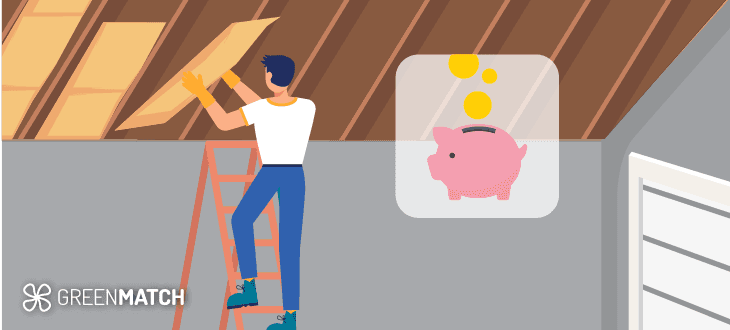
The cheapest way to insulate a garage roof in the UK is by using affordable materials like fibreglass, which costs around £10 per square metre. Fibreglass is widely available and provides good thermal performance for its price. Other cost-effective options include cellulose and some rigid foam boards, which also offer a budget-friendly approach to insulation.
While opting for a DIY installation can significantly reduce labour costs—typically ranging from £30-£45 per square metre—there are risks involved. Poorly installed insulation can lead to problems like moisture buildup, inadequate thermal performance, and future repairs that can become expensive. Improper insulation can also reduce the energy efficiency of your garage, negating any initial savings from DIY efforts.
Because of these potential issues, hiring a professional installer is often a better long-term investment. Professionals ensure the insulation is correctly fitted, helping to prevent costly problems down the road. While the upfront cost may be higher, it can save you from expensive repairs and maximise energy efficiency, making professional insulation a wise choice for a long-lasting solution.
Is insulation for garage roof worth it?
Garage roof insulation is a valuable investment for several key reasons. First and foremost, it helps significantly reduce heat loss, especially if your garage is attached to your home. This can lower your energy bills by preventing warm air from escaping in winter and keeping the garage cooler in summer. Insulating the garage roof also makes the space more comfortable to use year-round, whether you use the garage for storage, as a workspace, or as an additional living area.
Additionally, garage roof insulation helps protect your belongings and the garage structure itself from temperature fluctuations and condensation, reducing the risk of rust, mould, and moisture-related damage. It’s also essential to consider that proper insulation can help meet UK building regulations, which require adequate thermal performance in buildings, particularly when converting a garage into a habitable space.
To ensure the best results and compliance with roof insulation regulations, it’s highly recommended to hire professional installers. Professionals are fully informed of the latest regulations and ensure that your garage roof insulation meets the required standards.
DIY insulation can save on labour costs, but if not installed properly, it can lead to moisture problems or poor energy efficiency, resulting in later expensive repairs. Hiring professionals ensures correct installation, compliance with building regulations, and long-term energy savings and comfort. At GreenMatch, we can connect you with the best local insulation installers to help you save time and money. Just fill out our quick 30-second form, and you'll receive up to four free quotes from trusted professionals.
- Describe your needs
- Get free quotes
- Choose the best offer
It only takes 30 seconds



FAQ
The best insulation for a garage roof depends on your needs, but spray foam and rigid foam boards offer the highest thermal efficiency, while fibreglass and cellulose provide more affordable, eco-friendly options.
Yes, insulating a garage roof is worth it as it reduces heat loss, lowers energy bills, improves comfort, and protects the space from condensation and temperature fluctuations.
To insulate a garage ceiling in the UK, install materials like fibreglass batts, rigid foam boards, or spray foam between the ceiling joists, ensuring proper vapour barriers and ventilation to prevent moisture build up.
Yes, properly insulating a garage roof, along with ensuring adequate ventilation, can help prevent condensation by reducing temperature differences and moisture build up.
Garage roof insulation typically costs around £50 per square metre in the UK, depending on the materials used and labour costs.

Caoimhe is an experienced content writer and researcher who is passionate about providing accessible information to every reader. With a background in English literature and Sociology, she combines the two disciplines to create cohesive, well-thought-out, and well-informed pieces.
We strive to connect our customers with the right product and supplier. Would you like to be part of GreenMatch?

- Describe your needs
- Get free quotes
- Choose the best offer
It only takes 30 seconds



